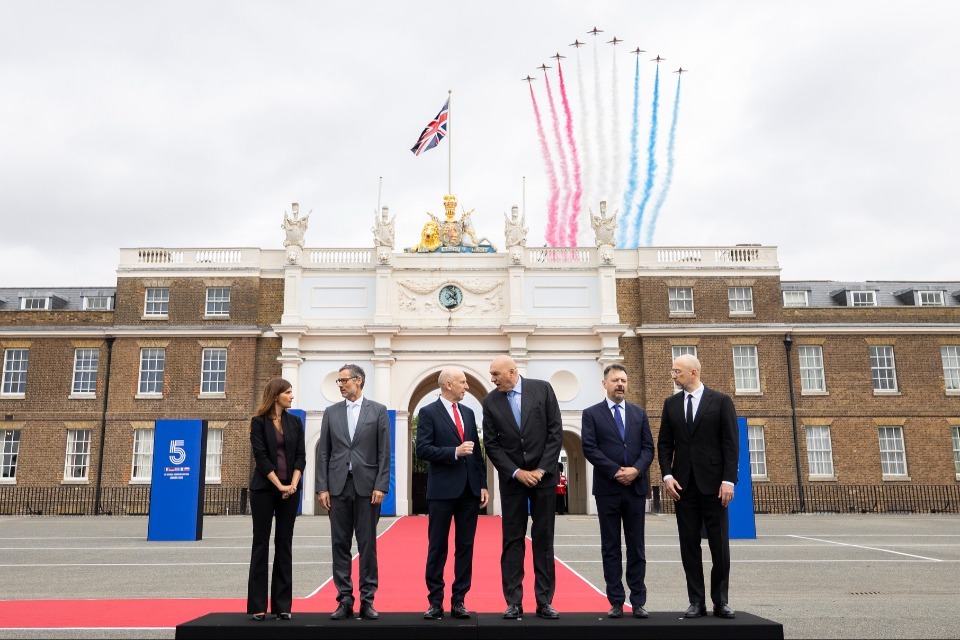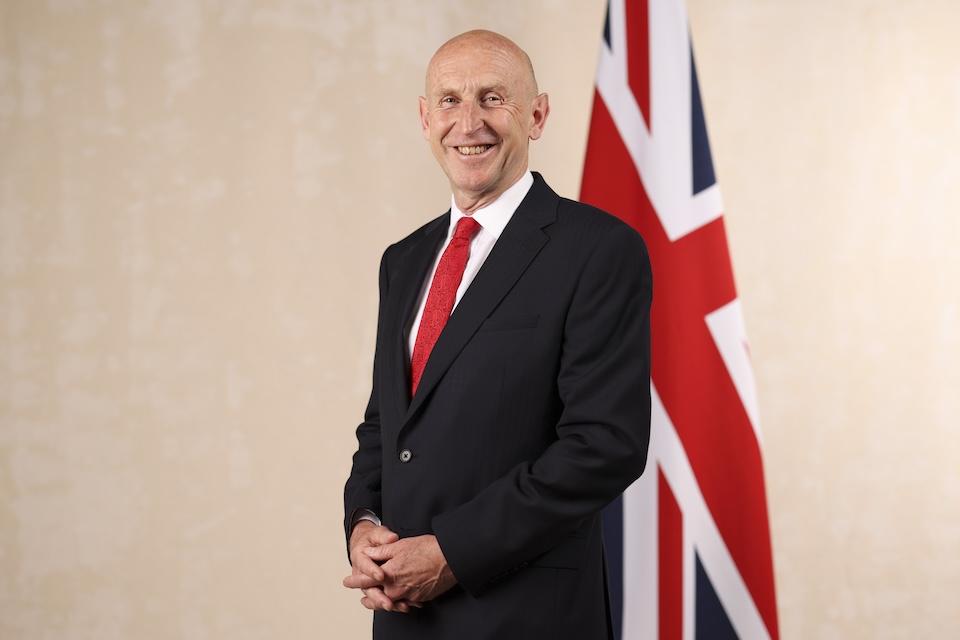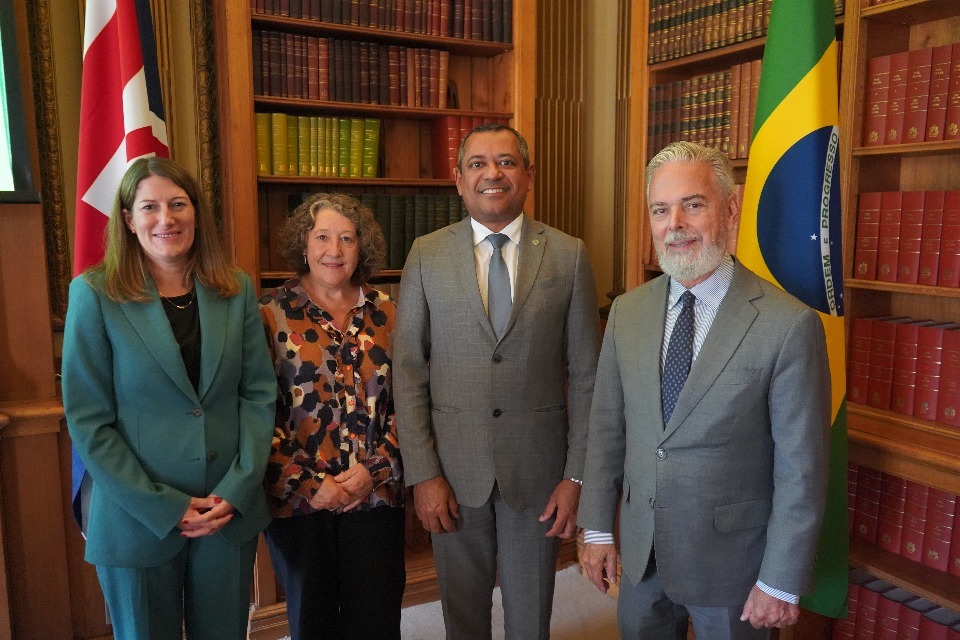Good afternoon,
We face a world that is increasingly contested and unpredictable, with rapid technological advancements reshaping warfare.
My mission is to move the Royal Navy to warfighting readiness over the next four years.
This is essential if we are to strengthen deterrence and preventing conflict in this new era of threat.
The 2025 National Security Strategy laid bare the scale of the challenge that we face – Russian aggression menacing our continent, strategic competition intensifying, extremist ideologies proliferating, technology transforming warfare, and hostile state activity occurring in and around the UK, impacting our interests.
The maritime domain, the sea and our shipping routes remain the essential cornerstone to our national security and growth in our economy.
Today the Royal Navy guards that domain so that food, energy, goods and data flow unimpeded into our daily lives.
And as part of our membership of NATO the Royal Navy maintains the ultimate guarantor of our national security – the Strategic Nuclear Deterrent.
Our work remains fundamentally the same as it has for hundreds of years – keep the sea lanes open, protect our nation from seaborne attack, promote and defend our national interests around the world.
The work would be familiar to many First Sea Lords before me. But the way we do it is changing, changing fast, and that’s what I want to talk about today.
We have four immediate priorities nuclear, innovation, leadership, and agility.
Nuclear deterrence is our top priority, requiring a whole-force effort across submarines, infrastructure, and protective forces.
Innovation is critical to adapting at the pace of technological change, both in how we work and in the capability we use.
Leadership Excellence is about inspiring and empowering teams while delivering results, creating an environment where everyone can thrive.
Agility is essential to remove barriers, streamline processes, and having a focus on what truly matters.
For 35 years, we have operated under the presumption of a “peace dividend,” taking calculated risks against emerging threats. This has resulted in a reduced fleet size and inevitable readiness challenges.
But the maritime domain yet remains the one essential to our national security.
Our operational schedule is as relentless as ever, with global deployments from the High North to the Indo-Pacific, securing trade routes and supporting allies.
Many of our ships, like the Type 23 Frigates, are ageing, extended to twice their planned service life.
And we work hard to recruit and retain the talent we need, and I am proud to serve alongside our outstanding people, but we need to continually find ways of doing better, and adapt faster.
The Strategic Defence Review was clear that we are at a turning point. At the 2025 NATO Summit, the UK Government made the pledge to spend 5% of GDP on national security by 2035.
An investment focused on lethality, readiness, munitions stockpiles, and technological innovation. Throughout its history the Royal Navy has been buccaneering, innovative and pioneering. These are the characteristics we now need, to meet the new challenges we face.
I come here today to make my first speech as First Sea Lord to share my approach with you, our industry partners. Because it is only together that we can successfully meet the challenges we face.
We need your imagination, your ideas, your innovation and your collaboration.
As our PM said yesterday ‘our Armed Forces are only as strong as the industry that stands behind them.’
We need to do things differently, to grow and diversify the fleet. To speed up the development of new capabilities and technologies by working with you to improve the flexibility with which we create, operate and improve the means we need to be able to fight and to win.
Together we will reimagine the Royal Navy as a new hybrid Navy. We will move to a dispersed but digitally connected fleet of crewed, uncrewed, and autonomous platforms that will redefine maritime military power.
We have a bold vision, which will place our country in the vanguard of autonomous warships and maritime warfare – under, on, above and from the sea.
That is not just for the Navy – but for UK industry as well. We want you to become the world’s leading exporter of autonomous vessels, as well as building the best warships in the world – as we’ve seen with the £10 billion Norway deal.
But let me be really clear – this is not an aspiration for some distant point in the future. It is a necessity now.
This will create a larger and more lethal fleet, with greater agility and resilience, and it is a move that will start while I am the First Sea Lord. To do this, we will be guided by a simple but powerful principle “uncrewed wherever possible; crewed only where necessary.”
This is not just a technological shift – it is a strategic transformation in how we project power, preserve lives, and adapt to the pace of modern warfare.
To illustrate, I will give examples of what we need to do above, under, on and from the sea.
We will have Hybrid Airwings by the end of this decade, leading NATO nations in a new way of air warfare from the maritime.
By the time the Carrier Strike Group returns to the Indo-Pacific for its next episodic deployment, its Carrier Air Wing will be almost unrecognisable – a fusion of crewed and uncrewed platforms, optimised for speed, survivability, adaptability and combat power.
To bring this to life, to make it real, with your help.
We intend to launch the first jet-powered collaborative platform drone as a concept demonstrator off a Queen Elizabeth-class aircraft carrier as soon as next year.
Atlantic Bastian is a groundbreaking concept revolutionising how we protect the UK and its allies in the underwater environment.
It will provide a formidable underwater defence posture from the Mid-Atlantic Ridge to the Norwegian Sea.
A blend of crewed and uncrewed host platforms will be networked together, but capable of independent operations, creating a system of systems that will enable us to find, track and if required act against our opponents, adding both mass and lethality to our already capable Submarines, Ships and aircraft in the North Atlantic.
We will have our first Bastion sensors in the water next year.
For the surface, imagine in the near future, a Type 26 Frigate goes into the North Atlantic. It is the most advanced Anti-Submarine Frigate in the world, a truly world leading ship capability with a highly trained and most effective crew. But it is not alone. It is sailing in company with two uncrewed escorts, who use AI to work in tandem with the warship. Together, they provide a 3 ship task group in their own right.
The escorts will protect the parent ship, adding to its sensors, weapons and decoy capabilities. Because they have no crew, the escorts are not complex vessels, they are easy to produce at scale, even easier to configure to specific mission requirements as the task demands.
If this sounds fanciful, it is not.
It is my aim to have the first of our uncrewed escort ships sailing alongside our RN warships within the next two years. We will then begin scaling across the Navy.
This approach will not only revolutionise our ability to put mass to sea, it will fundamentally change our future shipbuilding programme, enabling us to break the paradigm of only ever bigger, more expensive and complex warships.
We are also working to take this approach into our concepts for both the MRSS as part of our future littoral ships and for the T83 as our future Air Defence Destroyer, which will fundamentally change and improve what can be produced. I want both to be founded on a family of vessels, with crewed capabilities at their heart, but more modular, resilient, dispersed and powerful. Fit for modern warfighting.
Alongside all of this it would be remiss of me not to speak about the continued transformation of the Commando Force and their strategically vital role in support of both the Fleet and wider Integrated Force.
Our Royal Marine Commandos blend the best of human talent, selected and trained to operate independently in the harshest environments, with the very latest in technology.
Our Marines anticipated the future of modern warfare and have for almost 10 years been transforming in a way that now seems prescient for the war in Ukraine.
But now they must go further.
Ever more dispersed on the battlefield, connected but capable of independent action, enabled by ever more autonomy, they will be the embodiment of a 21st Century Commando.
This is essential because the High North in particular remains a critical area for the UK and a vulnerable northern flank for NATO. It is not only the gateway to the Atlantic for Russia’s increasingly capable submarine force, but it is a region where climate change is setting the stage for intense state competition over territory, access and resources.
Our continued ability to operate and fight in this most demanding environment is vital – and the UK Commando Force, as the most experienced and credible extreme cold weather operators, will be the tip of our NATO spear.
All this – the complete transformation of our force – will necessitate the biggest change of the culture, workforce training and skills for our sailors and marines since the turn of the last Century.
We are going to overhaul the Royal Navy’s approach to maritime warfare training to ensure our people are fully equipped to meet the work they are asked to do, creating the war fighting leaders of the future.
And Leaders matter.
Leaders at all levels dictate an organisation’s culture. Because of this, within the next 100 days, we will trial new tools to improve the way we assess leadership at all levels, focusing on both the ability to deliver outcomes and the impact leaders have on
the culture and well-being of the people in our teams.
We will find the best tools to help us identify those leaders who can practice leadership excellence – that is, delivering results while motivating and inspiring their people to be the best that they can be. When we identify them, we will promote them, put them in positions of authority and together they will help us to transform the Royal Navy.
Our job is to be ready to fight with what we have now, not what we hope to have in the future. Within 100 days, we will have defined, war-gamed and agreed a plan to ensure the Royal Navy is credible and moves to warfighting readiness over the next four year.
To do this we need to transform ourselves and we need your help, your partnership. We will all, together, need to lead our allies into a different way of warfare, rediscover how to fight at scale and have the courage to transform so that we can win that fight. Lead, fight, win – to make Britain secure at home and strong abroad.
We need partners in industry, large and small, to deliver the innovation we must have. I thank you for all you already do for us, and I look forward to what we will do together in the years ahead.







